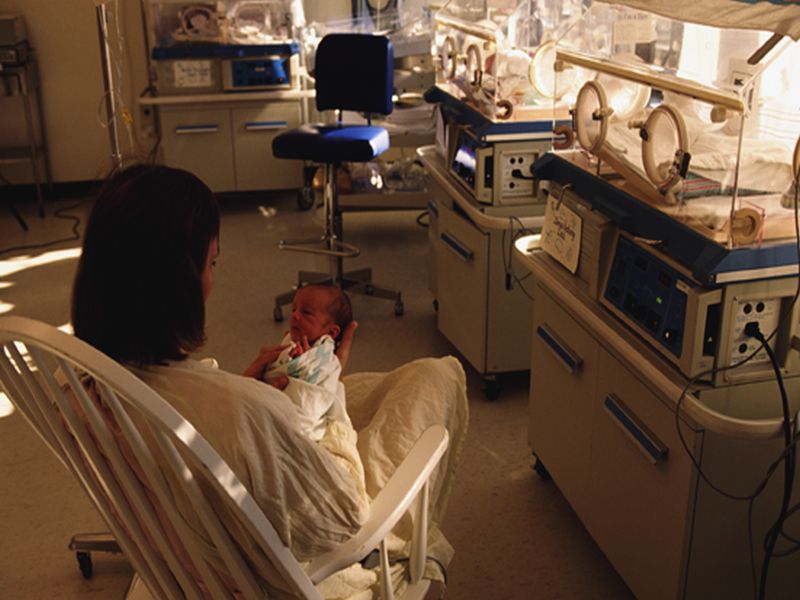Preterm Births to Hispanic Women Climbed After Trump's Election
By Amy NortonHealthDay Reporter

FRIDAY, July 19, 2019 (HealthDay News) -- The number of preterm births to Hispanic women in the United States inched up shortly after the 2016 election -- raising the question of whether the political climate played a role, researchers say.
The study, of births between 2009 and 2017, found an uptick in preterm deliveries among Hispanic women that occurred in the nine months after President Trump was elected.
During that time, there were 2,337 more preterm births to Hispanic women than expected, the researchers reported.
The specific reasons cannot be discerned from the numbers. But the pattern raises further questions about health effects from the politics around the 2016 election -- particularly anti-immigration sentiment and "racially charged rhetoric," the study authors said.
Studies have already found that the political climate caused stress among Hispanics, both U.S.- and foreign-born: Many people said they feared a family member or close friend would be deported, regardless of their status, said lead researcher Alison Gemmill.
Such stress can translate into ill health effects -- with preterm birth being one, said Gemmill, an assistant professor at Johns Hopkins Bloomberg School of Public Health, in Baltimore.
In fact, she said, a previous study of New York City women hinted that the 2016 election affected preterm birth rates there.
Those researchers found that premature births rose among the city's Hispanic population after the inauguration -- specifically among women who were foreign-born. However, Gemmill said, that study did not control for other trends that might have explained the findings.
So, her team looked at national data and corrected for other broad patterns -- like the ways in which births vary by season.
And the result was the same: an increase in preterm births among Hispanic women.
The findings were published online July 19 in JAMA Network Open.
There are different reasons the stress of the political climate might affect preterm birth rates, according to Dr. Diana Montoya-Williams, a neonatologist at Children's Hospital of Philadelphia.
For one, there could be direct physiological effects, she said. Psychological distress may contribute to body-wide inflammation, increases in "stress" hormones, and changes in immune function, for instance.
Those effects, Montoya-Williams said, can be "intimately linked" with the hormonal changes that are happening in pregnancy.
And then there are less-direct possibilities, she said. People worried about deportation might avoid seeing a doctor, for example.
The study fits into a bigger picture -- what researchers call the "social determinants of health," according to Montoya-Williams, who wrote an editorial published with the findings.
Recent research has been showing how your environment and social conditions -- from education to neighborhood safety to financial stress -- can affect your physical health.
"The broader question is, what determines 'health' in our society?" Montoya-Williams said. "How does the environment around us affect the biology within?"
Evidence is building that political events are one of those factors, she said.
For the study, Gemmill's team used federal data on over 32.8 million U.S. births between 2009 and 2017. The investigators found that among Hispanic moms, an additional 1,342 baby boys were born preterm in the nine months after Trump's election -- beyond what would be expected.
Among baby girls, there were an extra 995 preterm births.
In general, Gemmill said, male fetuses are more vulnerable to effects from maternal stress. So, the figures support the notion that widespread stress could have played a role, she added.
The study leaves a number of questions open. Montoya-Williams pointed to a couple: Were foreign-born or undocumented Hispanic women particularly affected? Could the same pattern be found among women of Middle Eastern or Muslim origin -- who were also targets of anti-immigration sentiment?
Gemmill also noted that the study looked only at figures up to July 2017.
"I do wonder if we'd see a sustained increase in preterm births beyond that," she said.
More information
The March of Dimes has more on the risk factors for preterm birth.

The news stories provided in Health News and our Health-E News Newsletter are a service of the nationally syndicated HealthDay® news and information company. Stories refer to national trends and breaking health news, and are not necessarily indicative of or always supported by our facility and providers. This information is provided for informational and educational purposes only, and is not intended to be a substitute for medical advice, diagnosis, or treatment.

